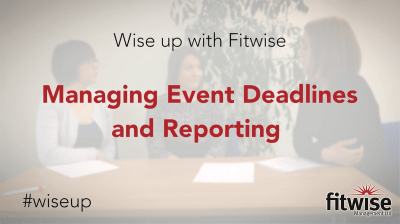
This is our seventh video to our series “Wise up with Fitwise”. To view all our videos visit our YouTube channel or video page of our website.

Managing event deadlines and reporting
To view the video CLICK HERE
To download the infographic CLICK HERE
Setting Event Deadlines

When it comes to setting event deadlines, it is best to start at the event date and work backwards. Take into consideration contract dates that you do not have any flexibility on and client commitments such as holidays and days when they are attending other events.
Using this as an initial starting point work backwards and list everything you need to collect, send out, complete and create and work out dates by which they need to be done. Always include a bit of flexibility with your dates, it’s best to be overcautious so if something changes you can adapt your timeline to suit your new situation.
Communicating Deadline Dates with Others

Once deadlines are set, it is important to send out the information to everyone involved to make sure it coincides with their availability. This gives everyone supporting the event the opportunity at the beginning to change any of the dates that do not work around their schedules.
Once deadlines are agreed with everyone, it is best to send a general reminder one to two weeks before to ensure no deadlines are missed. The best way to communicate is in writing, e.g. an email, so they can refer back in future dates but if deadlines are being missed pick up the phone to make sure your emails are getting through. It also helps to advertise all of your deadline dates as widely as possible. If that’s deadlines for your speakers or exhibitors to submit information to you, make sure it is listed in as many places as possible.
It is important to be overcautious and flexible in case you do miss a deadline date, so it does not impact other factors of the event. You should determine who and what are the factors of the event that are effected and how these can be resolved.
Key Performance Indicators

It is extremely important to set key performance indicators for the event and to provide regular reports.
Reports can include information on:
- Delegate numbers and types
- Website and social media activity
- Exhibitor and sponsorship updates
- Abstract submissions
- Completed and future actions planned
Continuous communication with your Conference Organising Group (COG) will ensure all deadline dates are met and a successful conference on the day.
